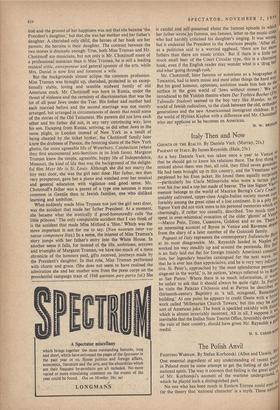The American Way of Life
A LOST PARADISE: Early Reminiscences. By Samuel Chotzinoff. (Hamish Hamilton, 21s.) A LOST PARADISE: Early Reminiscences. By Samuel Chotzinoff. (Hamish Hamilton, 21s.)
AIEN who knew the story of Hazlitt's life were surprised that he (lied having, in his belief, had a happy life. Some of the same surprise must be felt by the readers of Mr. Chotzinoff's fascinating ,rturn to his childhood and youth. But no such feelings will occur to the reader of Miss Truman's charming recollections. Her Illemories of a happy childhood and youth carry complete convic-
tion and the ground of her happiness was not that she became 'the President's daughter,' but that she was her mother and her father's daughter. A cherished only child, the heroes of her book are her parents; the heroine is their daughter. The contrast between the two stories is dramatic enough. True, both Miss Truman and Mr. Chotzinoff are musicians, but not only is Mr. Chotzinoff more of a professional musician than is Miss Truman, he is still a leading musical critic, entrepreneur and general sponsor of the arts, while Mrs. Daniel is now first and foremost a wife.
But the backgrounds almost eclipse the common profession. Miss Truman was brought up, cherished, protected in an excep- tionally stable, loving and sensible midwest family of old American stock. Mr. Chotzinoff was born in Russia, under the threat of violence and the certainty of discrimination that was the lot of all poor Jews under the Tsar. His father and mother had each married before and the second marriage was not merely arranged, but arranged in circumstances of deceit that recall some of the stories of the Old Testament. His parents did not love each other and his father did not, in any very convincing way, love his son. Escaping from Russia, arriving, as did other Jews in the same plight, in London instead of New York as a result of being cheated by the ticket broker, the Chotzinoff family later knew the drabness of Passaic, the festering slums of the New York ghetto, the more agreeable life of Waterbury, Connecticut (where they first encountered anti-Semitism in its Irish form). Margaret Truman knew the simple, agreeable, happy life of Independence, Missouri, the kind of life that was the background of the delight- ful film Meet Me in St. Louis. Although she did not marry the boy next door, she was the girl next door. Her father, not then very prosperous, gave her a piano and watched over her musical and general education with vigilance and good sense. Mr. Chotzinoff's father was a parent of a type one assumes is more common in Gentile than in Jewish families, one who disliked learning and ambition.
What suddenly made Miss Truman not just the girl next door, was the accident that made her father President. At a moment, she became what she ironically if good-humouredly calls 'the little princess.' The only comparable accident that I can think of is the accident that made Miss Mitford a 'Hon.' Which was the more important is not for me to say. (Non nostrum inter vos tantas componere lites.) In a sense, the interest of Miss Truman's story jumps with her father's entry into the White House. In another sense it falls, for instead of the life, ambitions, sorrows and triumphs of Margaret Truman, we have too much of a mere chronicle of the honours paid, gifts received, journeys made by the President's daughter. In that role, Miss Truman performed with charm and grace. (She does not seem to have realised the admiration she and her mother won from the press corps on the presidential campaign train of 1948 quorum pars parva fui.) She is candid and self-possessed about the famous episode in which her father wrote his famous, too famous, letter to the music critic who had harshly criticised his daughter's singing. It was wrong but it endeared the President to the American people. 'After all, as a politician said to a worried egghead, 'there are far more fathers than there are music critics.' But if there is a little too much small beer of the Court Circular type, this is a charmla, book, even if the English reader may wonder what is a 'drag bid' and what 'going through rush.'
Mr. Chotzinoff, later famous or notorious as a biographer of Toscanini, had to learn music and most other things the hard wag' But his good humour, optimism, ambition made him bob to the surface in the grim world of 'Jews without money.' We are introduced to the Yiddish theatre where Der Yeshiva Bocher (The Talmudic Student) seemed to the boy very like Hamlet, to the world of Jewish radicalism, to the clash between the old, orthod°./: generations and the new Americanised immigrant children./it 1„ the world of Hyman Kaplan with a difference and Mr. Chotzinoll wins our applause as he becomes an American. D. W. BROGAS



































 Previous page
Previous page